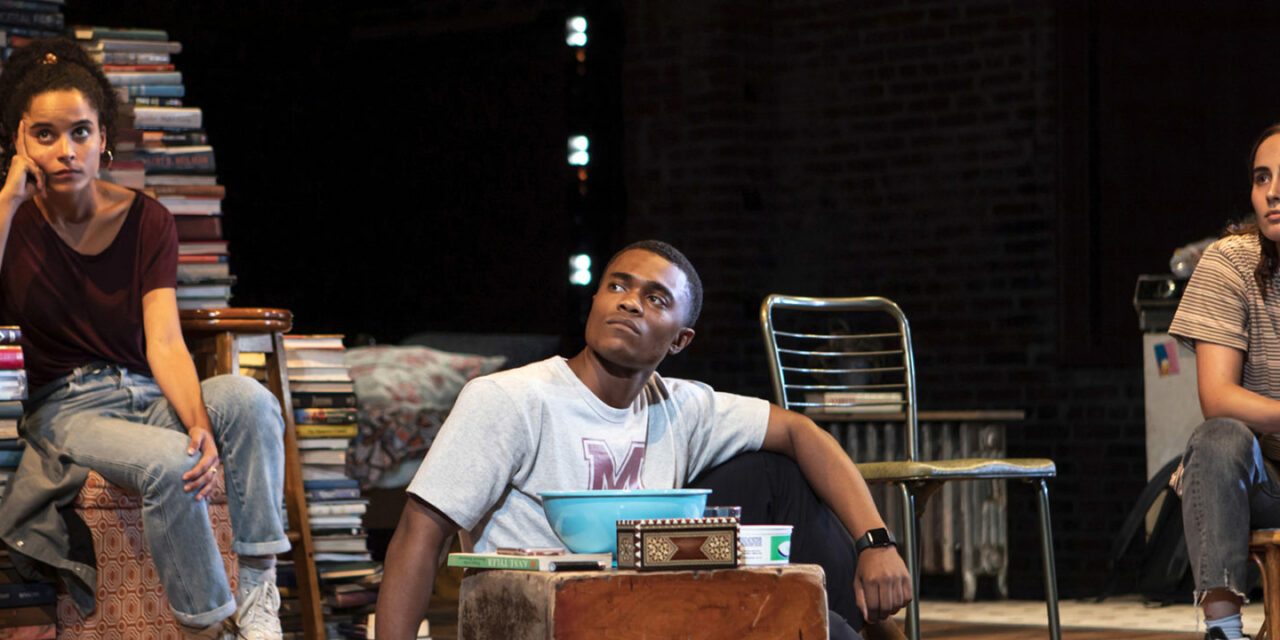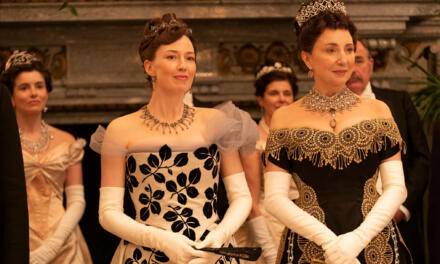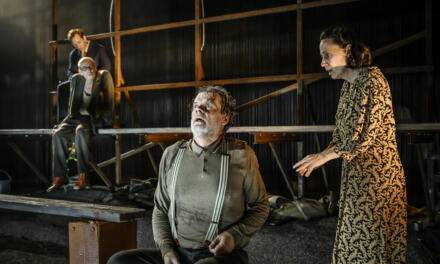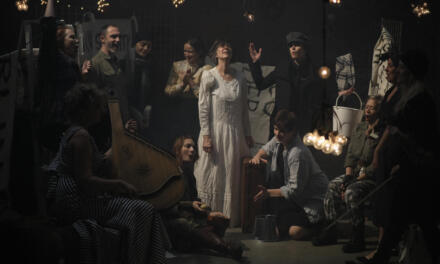Hot off the heels of the success of Harry Potter and the Cursed Child, playwright Jack Thorne has another new work about precocious young people and the choices they made that define their identities. Sunday, written by Tony Award winner Thorne and directed and choreographed by Obie Award winner Lee Sunday Evans (In the Green), had its world premiere Off-Broadway on September 4th at New York’s Atlantic Theater Company. The new play focuses on a group of adults in their mid-20s who meet for a book club. They start discussing a book, but quickly jump into intellectual and emotional debates that spin out of control, impacting their friendships and the ways in which they see each other.
Towards the beginning, one of the characters asks the others a question about a seemingly hypothetical scenario. If someone with special needs asked them to dance in front of a whole crowd of people, would they do so? They answer yes. He then asks them what their 13 year old selves would’ve said at a school dance. Hesitantly, they all answer no. They explain that at the time, none of them would’ve felt secure enough to do so, being too afraid of what their classmates would’ve said.
At a time in which our society inquires more and more about past transgressions and if they can be atoned for, this poses an intriguing line of thought. Can people outgrow bad behavior? What about the need to feel popular? How much do people really change? A follow-up question another character asks about a toxic roommate needing a place to live complicates things further. While the members of the book club pose these questions to each other, it’s painfully clear that they themselves lived through these situations and still think about them today as “defining moments” in who they are as people. Starting off on this note, the show sets itself up for an intellectually intriguing premise.
Disappointingly, it then goes nowhere with it. One of the characters asks, “can we get back to the book?” and back to the book we go. Of course, there are constant distractions. But none of them speak to a cohesive theme. The group discusses things ranging from toxic masculinity to phone use to finding jobs after college. Classic “millennial discourse.” But the issue is, instead of diving deep into these subjects, the script merely skirts around them. It brings up a subject, tosses it around for a while, and then puts it down, satisfied that it played with it for a bit without ever truly examining it. The discussion of toxic masculinity involves a character making the claim that every book has toxic masculinity, played more for weak laughs than for serious thought.
Speaking of toxic masculinity, one of the characters serves as your typical, run-of-the-mill, “Wall Street Bro” archetype, speaking over everyone else and bragging about his perceived success. He constantly says “you don’t even know me,” implying that there’s more depth to him than meets the eye. And like any human being, there is. He has insecurities, but no more than any other character in the show. Practically every character yells out some iteration of “you don’t even know me,” at some point. To really hammer the point home, one character doubles as a narrator, occasionally interrupting to provide backstory or speak about a character’s future like a protagonist in a Stephen King novel.
The main action also gets interrupted by dance segments, but these prove quite exciting. When characters start ruminating about another moral or literary topic, these interludes inject a jolt of energy into the proceedings. They’re tightly choreographed, vivid, and also interpretive. We get more subtle bits of information about the characters’ dynamics and relationships than we do from the narration. In these moments, Evans’s directing and Masha Tsimring’s lighting design really shine through. There’s always a sense that something lies just beneath the surface of each of these character’s anecdotes, questions, and actions, and these interludes bring those anxieties and other emotions bubbling towards the surface. The scenic design by Brett J. Banakis also deserves special commendation. A massive pile of books dominates center stage. At first it seems to exist to really drive home the point that these people read. A lot. But gradually it starts to take on other roles, featuring in these dance interludes as a mountain for characters to try to scale.
While the first half of the show focuses on the book club, the second half focuses on an impromptu meeting between two characters, a sort of “missed connection.” Without the members of the book club all vying for attention and validation, this section allows the play to breathe a bit and focus on human connection. Sadie Scott and Maurice Jones captivate in this late-game segment. Overall, Sunday is about a lot of concepts and questions, some intriguing, some not. But it never really stays with one long enough, jumping from concept to concept, page to page, like a student skimming a novel that they have to read for class the next morning.
This post was written by the author in their personal capacity.The opinions expressed in this article are the author’s own and do not reflect the view of The Theatre Times, their staff or collaborators.
This post was written by Andrew Agress.
The views expressed here belong to the author and do not necessarily reflect our views and opinions.


















